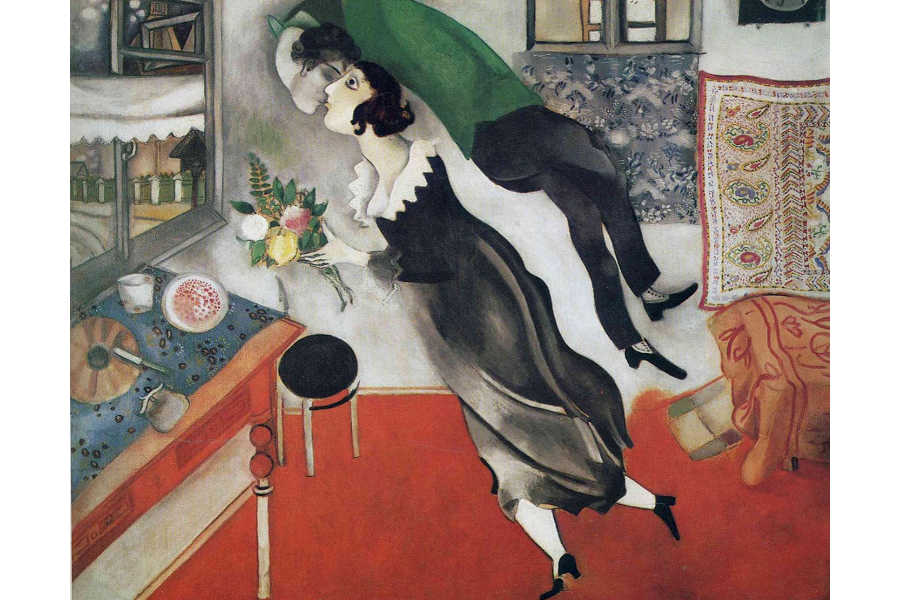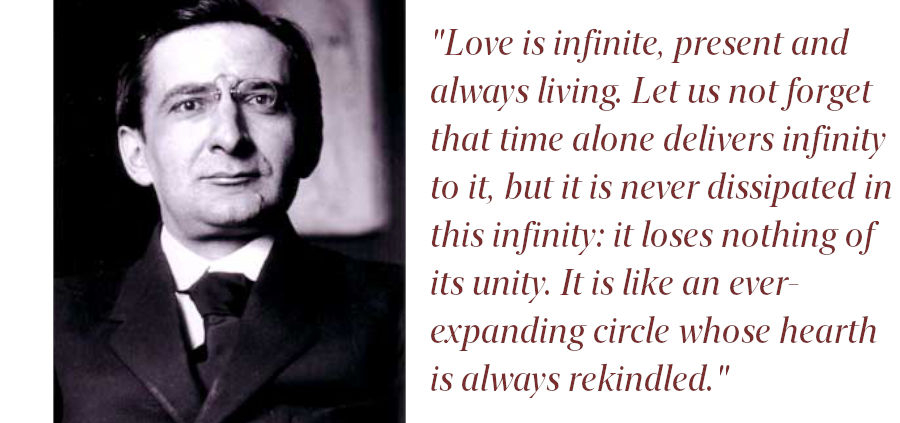Responses to Louis Lavelle’s “The Act of Loving”: A Call and Response Part II: The Preservation of Univocity by Wally Swist
This is the second of a two-part essay on the French philosopher Louis Lavelle’s The Act of Loving. In his introduction to part I, available here, author Wally Swist writes: “In my attempt to try to understand where I was with regard to caregiving my partner, especially with there being a decline and deterioration in her condition of dementia, I had the opportunity to read the French philosopher Louis Lavelle’s (1883–1951) The Act of Loving and find within myself a “call and response” to specific parts of the work that resonated with me. These resonances led to my own insights regarding the caregiver and the act of loving. The quotes below appear from a new translation of Lavelle’s book by Robert Alan Jones, an Australian who is considered an authority on Lavelle.” Lavelle’s words are in italics, followed by Swist’s commentary—Ed.
“Love has a two-fold ontological import: first, because it is the link between the finite being and the infinite Being, which shows that there is no love but love of God and that the love we have for a particular being must itself be an infinite love because it always has God as its end, so that it gives the person who loves that spiritual co-extensiveness with the totality of Being which allows the preservation of univocity; next, because love posits the existence of the loved object, solicits his internal activity and evokes in him a kind of doubling-back such that for the two beings who love each other, each is doubly necessary in order to posit the other’s existence from the outside in some fashion, though not absolutely from the outside: for one can posit the other from the outside only to evoke in him an intimacy that is of-a-piece with one’s own, becoming common with one’s own at the point where they both give proof of their mutual origin and of the constant birth of the many in the One, lacking which the One would be only an abstract and ideal unity, and not a concrete and living union that continues to be produced and reborn indefinitely, so to speak.”
The definition of univocity is the philosophical idea that words applied to God mean the same thing when applied to people or things. For Lavelle to differentiate “a two-fold ontological” point in what is a philosophical hermeneutic, and then to connect “finite Being and the infinite Being” with regard to the lover and the one who is loved—and, in the process, to make the eventual connection to “the constant birth of the many in the One”—is to be made aware of a phenomenology of supreme spiritual union.
Lavelle’s philosophical interpretation of love can connote an image similar to that of Marc Chagall’s lovers hovering in space, at one with each other and space itself. However, what may be more fitting is Walt Whitman’s concluding poem, number 52, in his epic “Song of Myself,” when he writes:
Failing to fetch me at first keep encouraged,
Missing me one place search another,
I stop somewhere waiting for you.
“Furthermore, love is the act that makes us forfeit existence. It is ever a gift of self and a sacrifice. But it can be said that what we lose is only existence in the strict and individual sense of the word and that love has to make us forfeit existence only in order for us to penetrate Being, where there is no longer anything that can remain exterior to us, where everything is for us sheer intimacy. But that is possible, and our personal being escapes being dissolved or abolished in Being, only if the love for which we are the object restores to us a new existence, different from the one we have lost, an existence that resides in that completely spiritual activity through which our separate individuality had agreed to sacrifice itself.”
What I believe Lavelle is guiding us to here is really the sacrifice of Christ. Christ’s sacrifice on the cross is really our own as well, and not just metaphorically speaking. Sacrifice, in our society, especially American society, is an unrecognized word as well as an unremembered act, which has been replaced with its unfortunate opposite: entitlement.
In sacrifice, we discover love; in entitlement we find only an egoic state but one that is loveless. When Joseph Campbell spoke of the man in the subway station waiting to take his train home from his job as having sacrificed himself every day for his family, he was really speaking about love. Love and sacrifice are as much part of each other as loyalty and love are.
We ache with love, and for love, because of the sacrifice we make for those we do love. In doing so, “our separate individuality has agreed to sacrifice itself.” We can’t realize one without the other. It is this feeling that we often hear ourselves describe as being so much alive—when we feel love, but also when we act from love.
That sacrifice we make is what constitutes real loving, although it doesn’t necessarily need to make us feel as if we are soaring. Getting up early to set the breakfast table and make the coffee can be a form of sacrifice and loving, even though we may not feel it, if we do it with care and with love. Oftentimes in what is commonplace, if we are truly present, we can feel the shift of the numinous.

Marc Chagall, The Birthday, 1915
“But to act through love is for each of us to act from himself. Love is thus the actuality of freedom. No one has better noted this character of love than Dante in Canto XVIII of Purgatory, in one of the most beautiful passages of The Divine Comedy, where he writes, when “the love that is lit within us springs from necessity, it is again only desire”. But “within you as well is the power of suppressing it, the noble virtue that Beatrice calls free will”. Now, free will seeks true love, which rejects the subjection typical of desire and gives satisfaction and nourishment, both at once, to intelligence and will. Love perpetually renews within us the feeling of our freedom; when love is a chain inside us it is dead.”
Necessity as a caregiver, of the ameliorating one who is being cared for and the forbearance of the dementia sufferer’s endless repeating of questions and phrases, the attending to and the preparing of meals, to the organizing of day trips and movie nights, “the love that is lit within us” does “spring from necessity.” Dante’s line from Canto XVIII resonates deeply, as does Lavelle’s interpretation and exegesis.
“The sole thing that can sustain us, even in the most commonplace occupations of our life, is that they are done for someone.”
As Brother Lawrence has stated continuously in The Practice of the Presence of God, divinity itself can be found from moment to moment in a monastery kitchen. As I make my case from caregiving, especially in its incumbent humbleness, we are able to find the numinous in the commonplace.
“Love is infinite, present and always living. Let us not forget that time alone delivers infinity to it, but it is never dissipated in this infinity: it loses nothing of its unity. It is like an ever-expanding circle whose hearth is always rekindled.
“So one could say that just as the supreme thinking is reflected in us, pure love is also loving in us. And it is equally true that reflexion can be regarded as a mediation that always gives us new motives to love and that love arouses it, as though the light within us were ever an effect of fervour.”
Lyrically, Lavelle links love with infinity, but also to unity. Our acts of loving, of caregiving, even if we are exhausted and not actually feeling we are loving, are indeed loving. Lavelle leaves us with the notion that through all of our ardor in undertaking the tasks that we perform for those we care for, it is our fervor, concomitant to the sacrifices that we make, that we may find within ourselves that “love is also loving in us.” We might have believed it was possibly beyond us, but we have seemingly, miraculously actualized it within ourselves to be given out freely to the ones we care for, to the ones we love. ♦
Wally Swist’s recent books include Taking Residence (Shanti Arts, 2021), Evanescence: Selected Poems (Shanti Arts, 2020), and On Beauty: Essays, Reviews, Fiction, and Plays (Adelaide Books, 2018). His book A Bird Who Seems to Know Me: Poems Regarding Birds & Nature was the winner of the 2018 Ex Ophidia Press Poetry Prize and published in 2019. A Writer’s Statements on Beauty: New and Selected Essays and Reviews was published by Shanti Arts in April 2022. His previous essays on caretakeing, “Participating in God’s Being” and “Transforming Responsive Caregiving into Seeds of God,” may also be of interest to readers.





Leave a Reply
Want to join the discussion?Feel free to contribute!